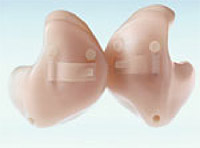Hearing Aids
Hearing Aids are a major life investment for your health and well being. Take the time to research where you should go to get the best quality and value for your investment of time and money.
If you follow these guidelines you can expect these benefits from professionally selected and fit hearing aids:
 Improvement in your ability to understand conversational speech.
Improvement in your ability to understand conversational speech.- Better hearing in noisy situations.
- Soft sounds are heard as soft.
- Loud sounds are never too loud.
- Your hearing aids are comfortable.
Step One: Get a Professional Evaluation from an Audiologist
What is an Audiologist?
Audiologists are university trained health care professionals with a Master’s or Doctoral degree in Audiology. Audiologists are specialists in the evaluation and non-medical treatment of hearing loss, including hearing aids and assistive listening devices. Today’s technology requires precise adjustments. It’s important to have an experienced Audiologist fit and program the device for the best performance and comfort.
Ask Your Doctor for a Referral
Your doctor can refer you to an Audiologist. Your health insurance may cover the evaluation.
Locate an Audiologist near you.
What You Should Expect
A complete assessment of your hearing, lifestyle and individual needs. The audiologist will check your ears for wax and ask questions about your hearing loss symptoms, medical conditions and lifestyle. Testing includes sitting in a sound proof booth while listening to different sounds and speech.
Step Two: Work with the Audiologist to Select the Best Aids for You
Advances in digital technology make hearing aids work better, adapt faster, and feel more comfortable than ever before. They are mini-computers performing thousands of calculations a second. The amount of new features continues to grow - rechargeable batteries, automatic feedback reduction, directional microphones, and remote controls, the ability to connect with blue tooth phones and more. Your hearing aids features depend on your needs and personal choice.
- Style of aids: The degree and type of your hearing loss will determine which styles will work best for you. Be honest about any cosmetic concerns you may have.
- Your lifestyle: People who are very active may need features that adjust to a greater range of situations. It is helpful to bring two or three situations or examples of where you need hearing help.
- Comfort level: Today’s hearing aids are much smaller, more comfortable and sound more natural than ever before. You may prefer a certain type because it is easier for you to adjust and care for it.
- Price: The audiologist will offer a choice of styles and prices to combine the right amount of features and value for you. Your health insurance may cover a portion of the fee. Ask about financing options. Extended warranties and loss and damage insurance are often available to protect your investment.
Step Three: Work with the Audiologist to adjust the aids for your hearing loss
Initially your aids will be programmed for your hearing loss and experience level. Real Ear Measurement may be used to verify that the aids match targets for audibility and comfort for speech.
Step Four: Trial Period
You should have at least 30 days to try the aids in your everyday activities. It may take several weeks to adjust to the new sounds, and it may take several sessions to adjust the aids. If at the end of the trial period you are not getting sufficient benefit to warrant purchase you can get your money back, less a reasonable dispensing fee.
Step Five: Training and Support
Research shows that people who receive aural (hearing) rehabilitation get more benefit from their aids. Ideally group classes should supplement individual sessions of hearing aid orientation. Make sure you return to your audiologist for fine tuning and support.
FAQ
Is there a hearing aid that can eliminate background noise?
- Digital noise reduction can reduce but not entirely eliminate noise. Using directional microphones has been shown to improve speech understanding in background noise.
Do I need two hearing aids?
- Yes. Using two aids improves hearing in noise and at a distance and keeps both ears stimulated. Many of the advanced hearing aids work as a binaural system.
How long does it take to adjust to new hearing aids?
- It can take several weeks to completely adjust to your new hearing aids. This adjustment period is essential to get the maximum benefit from your hearing aids, but remember that you’ll be enjoying more of the sounds you love very soon.
Do I need to wear my aids every day?
- Yes. To get the most benefit you need to stimulate the ear and hearing parts of the brain with the new signal to “retrain” your hearing and improve your listening.
Courtesy of Dr. Joan McCormack, Atlantic Hearing Care, Swampscott